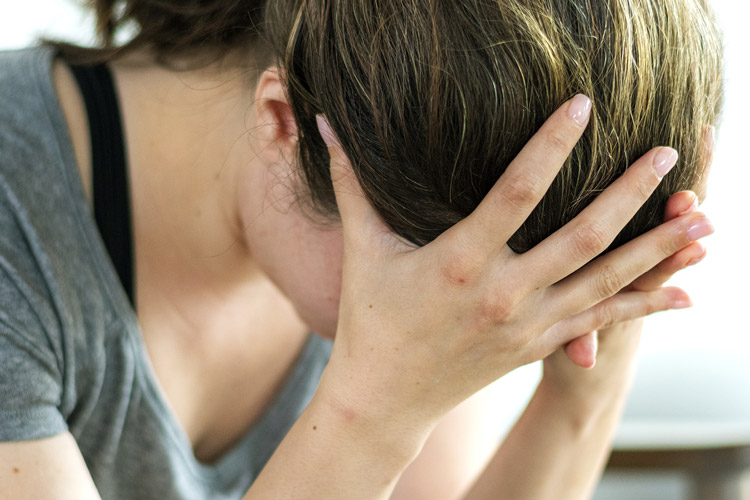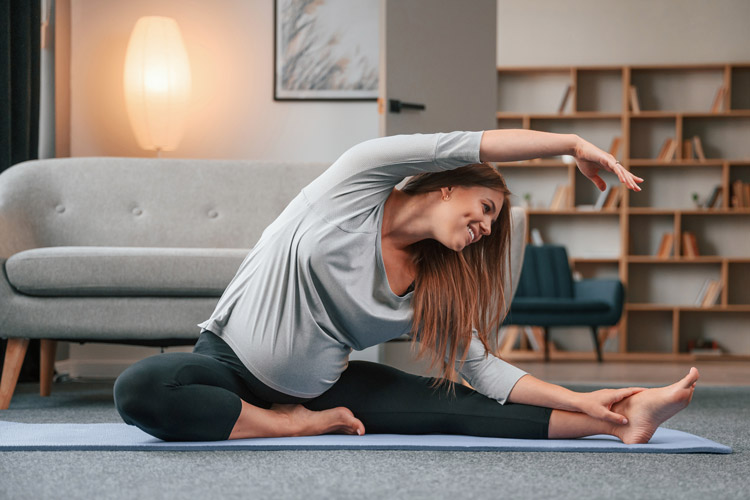OUR GUIDE TO ANXIETY IN MENOPAUSE
Anxiety might be the only symptom of perimenopause and menopause that we experience. We often don’t make the connection and just put this down to more stress in our lives.
Anxiety is a normal human response to stressful situations, part of our flight and fight response which keeps us safe in precarious situations. It starts to be an issue when it becomes hard to control our fear, making us feel stressed or overwhelmed or getting in the way of our ability to live life as we want to.
What does menopause anxiety feel like?
Many of us suddenly feel unable to cope with situations that were never a problem. We can feel overwhelmed by the superficial aspects of day-to-day living. And for some women, perimenopause is when they will have their first panic attacks.

Anxiety in menopause will often creep up on us insidiously. Many women describe anxiety in menopause as feelings of anticipation, dread, or fear.
Anxiety disorders include physical symptoms such as:
- Fast heart rate
- Heart palpitations
- The feeling of sickness or nausea
- Shaking or tremors
- Sweating
- Dry mouth
- Chest pain
- Headaches
- Fast breathing
- Panic attacks
How long does menopause anxiety last?
Menopause anxiety is different for everybody. For some of us, it lasts a short while, maybe a few months. For others, it can stay until all our symptoms settle. On average, perimenopause lasts 7 years.
A few women will have symptoms of anxiety after the transition and need to develop their toolbox to keep symptoms from creeping back.
What causes anxiety in menopause?
Anxiety can occur because falling oestrogen levels change the way our brain functions. Oestrogen is linked to levels of serotonin (the ‘happy hormone’) in the brain and cortisol levels (the hormone of stress), so when oestrogen levels drop, cortisol levels rise.
Anxiety symptoms may be related to physical changes, such as palpitations or insomnia, brought on by the changes in our hormones. Others may be directly associated with changing and rebalancing hormones during menopause.

How can anxiety in menopause be treated?
Hormone Replacement Therapy (HRT) can rebalance our hormones, positively affecting our serotonin, dopamine, and cortisol hormones, which all play a role in keeping calm and happy. But HRT is rarely the answer and just one part of the jigsaw to our wellbeing.
Self-care, including a healthy diet, regular daily exercise, sleep and moderating alcohol and caffeine intake, are equally important in treating anxiety.
Supplements can help reduce anxiety. Vitamin D is an essential supplement to take daily. Magnesium supplements can also make a difference if you suffer from restless legs, poor sleep and anxiety. Having a healthy, nutrient-dense diet is the most important to ensure there are no deficiencies that can exacerbate anxiety.
CBT (Cognitive Behaviour Therapy), meditation, mindfulness and breathwork are focused techniques that can reduce our anxiety levels. Many women find having a therapist to take them through the method helpful.

What can we do to reduce anxiety during menopause?
Every woman will develop their unique toolbox and ways to maintain their well-being.
My top tips are:
- Exercise: This is an essential tool in our box. Studies have shown that anxiety can be significantly reduced by regular, gentle exercise. Hence, it is vital to make this part of your daily routine.
Choose the forms of exercise you enjoy and aim for 30 minutes a day. This could be walking, running, swimming, cycling, yoga, weight training, team sports, or whatever appeals to you. Consistency is the key to preventing anxiety.
- Take breaks in your day and build in meditation and mindfulness. Slowing down and spending time ‘being’ rather than ‘doing’ will steady cortisol levels and help balance other hormones.
- Talk to others and keep social. Sometimes socialising is the last thing you feel like doing when anxious but keeping talking and sharing our feelings is protective when it comes to anxiety. Lack of a social network will lead to loneliness and heightened anxiety.
- Make self-care a priority. So much of our energy is devoted to what’s happening around us, such as work, family or caring for others. But it is essential to take time out to relax, reflect, keep a journal, engage in hobbies or take up activities that bring us joy.
Final Thoughts
Anxiety is a normal human response but can often become heightened in menopause. When menopause symptoms become intrusive and impact daily life, seeking help is essential. If you are struggling, speak to your GP or a menopause-trained doctor.
Anxiety can sometimes leave you feeling like you are in a dark place. If you are feeling suicidal, please call 111, the Samaritans or book an urgent appointment with your GP.



